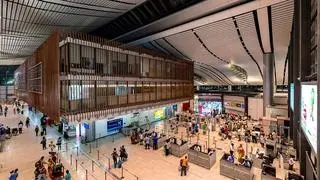The Bangladeshi arm of German gases major Linde sources liquid oxygen from the Jamshedpur facility of its Indian operations for processing at Linde’s facility near Dhaka.
Ten trucks carrying liquid oxygen in 40-foot-long cryogenic cylinders arrive at Petrapole- Benapole land border near Kolkata daily. As per the prevailing norm, the cargo is shifted to Bangladeshi vehicles for onward journey.
Cargo lossAccording to Motiar Rahaman, C&F (clearing and forwarding) agent of Linde Bangladesh, 15 per cent of the cargo — or more than a truckload of oxygen — is lost in transloading.
Participating in a stakeholders meet on proposed BBIN (Bhutan, Bangladesh, India, Nepal) motor vehicles agreement (MVA) organised by CUTS International in Kolkata on Thursday, Rahaman demanded immediate implementation of the pact to cut costs of oxygen in Bangladesh. Industrial gases have applications in many areas from infrastructure to healthcare. As a developing economy, Bangladesh’s demand for such gases is rising.
Bhutanese hurdleThe pact, which is now awaiting ratification of the Bhutanese Parliament, will allow seamless movement of vehicles. The details of the rollout, including country specific restrictions on entry of vehicles, will be decided at a later stage.
The Parliaments of India, Bangladesh and Nepal have ratified the agreement. The Upper House of the Bhutanese Parliament rejected the deal late last year, citing environmental concerns.
Dasho Karma W Penjor, Secretary in the Ministry of Information and Communications of Bhutan, assured the conference that a fresh attempt is under way to convince the legislators to clear the deal, failing which India, Nepal and Bangladesh would go ahead with implementation.
Dasho Kinley Dorji, former Secretary of the Ministry, reminded at the meeting that Bhutan’s perspectives on economic development is way different from its neighbours. “People say BBIN MVA would help us attract tourists. But, we are not interested in mass tourism. We want limited number of premium tourists who would spend $230 a day to make growth environmentally sustainable,” Dorji said.
Concerns were also raised by transporters. Bangladeshi Bus Truck Owners Association feels that allowing transit to foreign vehicles would clog Bangladeshi roads and rob local employment.
But the Bangladeshi Customs Clearing and Forwarding Agents Association was quick to point out that granting transit would help Bangladesh earn extra revenue over and above the reduction in trade costs of its own industry opening new opportunities.
Rahaman has a ready example of International Beverages, a Coca-Cola subsidiary, which had set up a huge facility near Dhaka.
The company is keen on the implementation of the MVA to cater the 3.5 crore people in the North-East Indian market from Bangladesh and for the import of fruit concentrates from Bhutan.
“Two years have already gone by since the BBIN nations decided to go ahead with MVA. Its time they implement the deal and give trade a chance,” Sheikh Md Farid, C&F association secretary, told the meeting.








Comments
Comments have to be in English, and in full sentences. They cannot be abusive or personal. Please abide by our community guidelines for posting your comments.
We have migrated to a new commenting platform. If you are already a registered user of TheHindu Businessline and logged in, you may continue to engage with our articles. If you do not have an account please register and login to post comments. Users can access their older comments by logging into their accounts on Vuukle.